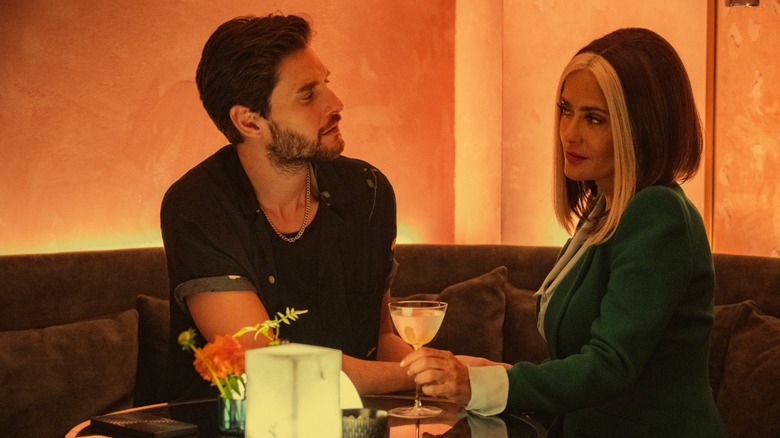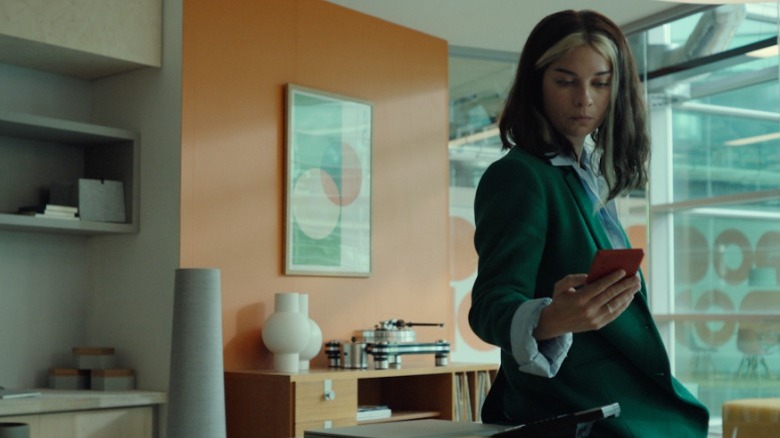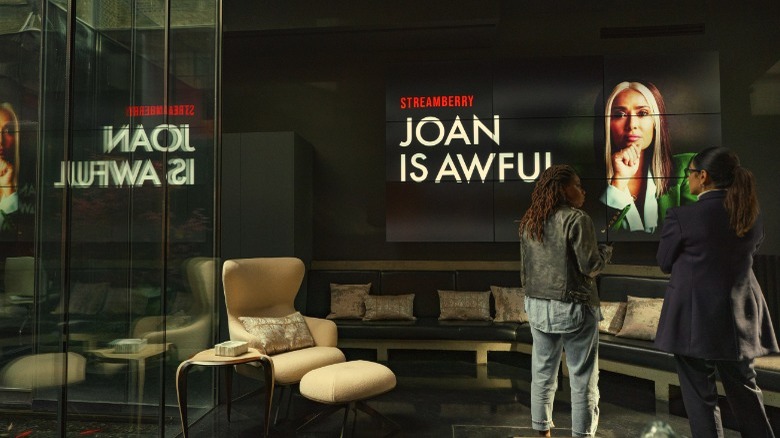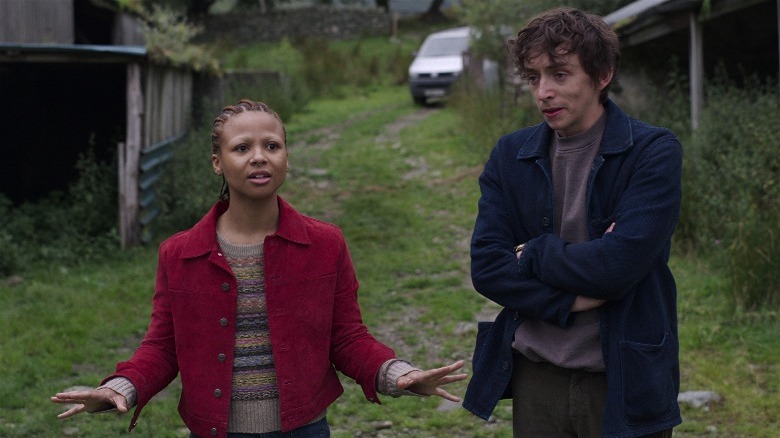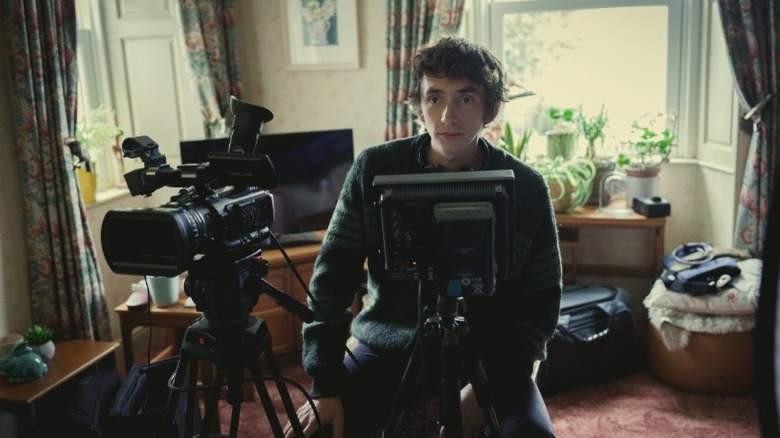Black Mirror's Commentary On Netflix Goes Beyond The Meta Season 6 Premiere
This post contains spoilers for "Black Mirror" season 6.
What do you do when the dystopian show you're making becomes a piece of the dystopia we're all living? If you're "Black Mirror" creator Charlie Brooker, the answer seems obvious: comment on it with the story. The new season of the acclaimed and long-running sci-fi series does just that, with not one but two episodes that directly address the bleaker aspects of the streaming empire led by Netflix, and the ethical fallout of a modern world built on "content."
In the years between "Black Mirror" seasons 5 and 6, the way audiences engage with and talk about Netflix has changed drastically. The streamer still has its loyal fans, to be sure, but between its penchant for canceling shows prematurely, recent price hikes, and not-so-consumer-friendly changes (not to mention, viewer metrics that are anything but clear), Netflix has garnered headlines for all the wrong reasons in recent years. There have also been some public moral reckonings related to the streamer's platforming of transphobia and its seemingly endless appetite for sleazy true crime retellings.
Brooker doesn't address every one of these shortcomings in the new season of "Black Mirror," but he's clearly bothered by some of the same existential questions the streaming era has inspired in many of us — and not afraid to bring the streamer directly into the conversation. Ahead of the season's release, much was made of how the premiere episode, "Joan Is Awful," mimics the exact style of Netflix's logo and interface for its fictional streamer Streamberry. Netflix, Brooker told Empire Magazine, was surprisingly chill about the whole thing. Watching the new season, though, it's clear that the filmmaker's interest in calling out Netflix goes way beyond logo design — and beyond "Joan is Awful."
The fictional company Streamberry is a clear Netflix stand-in
"Joan is Awful" initially seems more like an episode of "The Twilight Zone" than "Black Mirror." Its premise — a woman named Joan (Annie Murphy, though we'll later find out she's not the original Joan) becomes the subject of a TV show that airs new episodes every night, replaying the events of her day with Salma Hayek Pinault in the role of Joan — doesn't appear to have a scientific explanation at first. When Joan and a version of Salma check out their legal options and eventually break into Streamberry headquarters, though, they find out the CEO's master plan sounds disturbingly like some AI proposals we've heard about in real life.
As the women's lawyers explain, the series "Joan is Awful" is actually an experiment in personalized artificial intelligence storytelling. The show comes about through a mix of hyperactive listening devices on users' phones, officially licensed images of celebrities, and rapidly delivered AI-generated visuals. The kicker? Joan agreed to all of it when she signed her Streamberry terms and conditions. This satire is broad enough to be as silly as it is dark, but when Joan and Salma end up behind the scenes at Streamberry HQ, "Black Mirror" viewers finally get some of that biting, pointed commentary the show is known for.
A bleak AI storytelling twist
Streamberry's pride and joy turns out to be a "quamputer," which the CEO (Leila Farzad) describes as "an infinite content creator" capable of "shooting, packaging, and editing fully-edited programs that would normally take months to make." This sentiment is eerily similar to those shared by filmmakers who have embraced AI, like "Avengers: Endgame" director Joe Russo, who recently described the "curated storytelling" capabilities of the technology with a memorably ghoulish example involving reviving Marilyn Monroe's image from the dead to make her star in a rom-com with you.
The comment also brings to mind strategies shared by Netflix Tech Blog in a recent series about machine learning tools. "Netflix is building prototype stages and developing deep learning algorithms that will maximize cost efficiency and adoption of this transformational tech," the blog states, citing virtual productions and tools that match cut shots for filmmakers, among other things. Recently, a video from this series made the rounds on Twitter, kick-starting a conversation about when, exactly, art stops being art and starts being little more than tech. For artists and art lovers, it's pretty disheartening, and "Black Mirror" gets that.
"Joan Is Awful" also includes a darkly hilarious dig at the engagement-at-any-cost model that seems to be the norm in the streaming era. When asked why the title of the personalized content is so negative, the Streamberry CEO explains that viewers were less willing to buy into a positive story about themselves. If they watched a story focused on their worst traits, though, it, "put them in a state of mesmerized horror [...] which really drives engagement." This is an idea that Charlie Brooker explores further in the next episode, "Loch Henry,' which Joan actually scrolls past on Streamberry in the premiere.
Loch Henry tackles true crime amorality
In "Loch Henry," Charlie Brooker focuses specifically on Netflix's status as a bottomless pit of true crime content. There's a lot going on in this episode, and the commentary on the streaming era is only one piece of the puzzle this time around, but it's a pretty major piece nonetheless. When Davis (Samuel Blenkin) and his American girlfriend Pia (Myha'la Herrold) visit his Scottish hometown to film a niche documentary, Pia quickly becomes enraptured by a gruesome local story involving torture, sex crimes, murder, and the death of Davis' father.
Again, the conversation comes back to engagement above all else. When the pair meet with a producer about the new idea, she tells them they need a hook, and when Davis expresses apprehension about digging into such a personal topic — and about the lurid nature of the doc — Pia reassures him, with viewership stats in her eyes. Does he want to make an ultra-indie doc, she asks, or "something that people will watch? Something they actually want to see?" It's a question that real documentarians have been asking themselves in recent years, as pressure to connect with huge streaming audiences mounts. "It's not enough to do something that a few million people might really love when you're trying to reach 25 million people or 50 million people," a former Netflix exec told Vulture earlier this year.
'Are you still watching?'
Davis and Pia do get their award-winning, massively popular documentary, but it turns out it comes at a tremendous personal cost. Before their lives are derailed by the crime investigation, though, "Black Mirror" mentions Netflix by name, as a brash local bartender (Daniel Portman) notes that a Netflix-style true crime doc could bring loads of macabre tourists to the dying town. "What was that Netflix thing? About the guy that killed women?" the bartender asks. "Maybe narrow that down," Pia says wryly. She's a smart, shrewd character, and while "Joan is Awful" sets up Streamberry as the enemy, "Loch Henry" takes an even darker approach to the ethical conundrums of the streaming era — by asserting that Pia was actually right about what makes a successful true crime documentary.
"Black Mirror" has always been a "Wow, makes you think" kind of show. It's the sort of program that leaves you contemplating the horror shows we might one day experience and the ones we're already in, without offering many concrete solutions. Its most recent Netflix-skewering episodes are no exception. It's perfectly possible to finish "Joan is Awful" and "Loch Henry" with a strong desire to turn off Netflix for good, but to do so would be to turn off "Black Mirror," too. It's the sort of maddening catch-22 that some of Charlie Brooker's finest stories are made of. The sick part is, the Streamberry CEO is right; "Joan Is Awful" and "Loch Henry" make me feel bad, but my first impulse isn't to turn off the streamer. It's to watch them all over again.
"Black Mirror" season 6 is now on Netflix.
